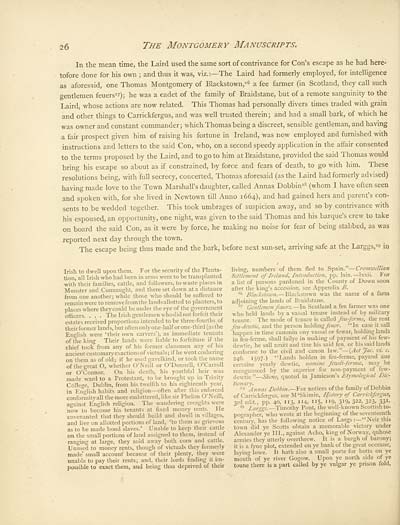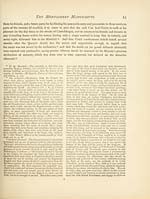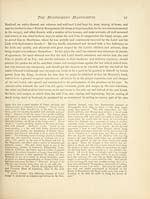Montgomery manuscripts
(40) Page 26
Download files
Complete book:
Individual page:
Thumbnail gallery: Grid view | List view

26
The Montgomery Manuscripts.
In the mean time, the Laird used the same sort of contrivance for Con's escape as he had here-
tofore done for his own ; and thus it was, viz.: — The Laird had formerly employed, for intelligence
as aforesaid, one Thomas Montgomery of Blackstown, 26 a fee farmer (in Scotland, they call such
o-entlemen fetters 27 ); he was a cadet of the family of Braidstane, but of a remote sanguinity to the
Laird, whose actions are now related. This Thomas had personally divers times traded with grain
and other things to Carrickfergus, and was well trusted therein; and had a small bark, of which he
was owner and constant commander; which Thomas being a discreet, sensible gentleman, and having
a fair prospect given him of raising his fortune in Ireland, was now employed and furnished with
instructions and letters to the said Con, who, on a second speedy application in the affair consented
to the terms proposed by the Laird, and to go to him at Braidstane, provided the said Thomas would
bring his escape so about as if constrained, by force and fears of death, to go with him. These
resolutions being, with full secrecy, concerted, Thomas aforesaid (as the Laird had formerly advised)
having made love to the Town Marshall's daughter, called Annas Dobbin 2S (whom I have often seen
and spoken with, for she lived in Newtown till Anno 1664), and had gained hers and parent's con-
sents to be wedded together. This took umbrages of suspicion away, and so by contrivance with
his espoused, an opportunity, one night, was given to the said Thomas and his barque's crew to take
on board the said Con, as it were by force, he making no noise for fear of being stabbed, as was
reported next day through the town.
The escape being thus made and the bark, before next sun-set, arriving safe at the Larggs, 2 ? in
Irish to dwell upon them. For the security of the Planta-
tion, all Irish who had been in arms were to be transplanted
with their families, cattle, and followers, to waste places in
Minister and Connaught, and there set down at a distance
from one another; while those who should be suffered to
remain were to remove from the lands allotted to planters, to
places where they could be under the eye of the government
officers. . . . The Irish gentlemen whodidnot forfeit their
estates received proportions intended to be three-fourths, of
their former lands, but often only one-half or one-third (as the
English were 'their own carvers'), as immediate tenants
of the king Their lands were liable to forfeiture if the
chief took from any of his former clansmen any of his
ancient customaryeNactionsof victuals; if he went coshering
on them as of old; if he used gavelkind, or took the name
of the great O, whether O'Neill or O'Donnell, O'Carroll
or O'Connor. On his death, his youthful heir was
made ward to a Protestant, to be brought up in Trinity
College, Dublin, from his twelfth to his eighteenth year,
in English habits and religion — often after this enforced
conformity all the more embittered, like sir Phelim O'Neill,
against English religion. The wandering creaghts were
now to become his tenants at fixed money rents. He
covenanted that they should build and dwell in villages,
and live on allotted portions of land, 'to them as grievous
as to be made bond slaves.' Unable to keep their cattle
on the small portions of land assigned to them, instead of
ranging at large, they sold away both com and cattle.
Unused to money rents, though of victuals they formerly
made small account because of their plenty, they were
unable to pay their rents; and, their lords finding it im-
possible to exact them, and being thus deprived of their
living, numbers of them fled to Spain." — Crornwellian
Settlement of Ireland, Introduction, pp. lxix. — lxxii. For
a list of persons pardoned in the County of Down soon
after the king's accession, see Appendix B.
26 Blackstoivn. — Blackstown was the name of a farm
adjoining the lands of Braidstane.
27 Gentlemen fours. — In Scotland a feu farmer was one
who held lands by a vassal tenure instead of by military
tenure. The mode of tenure is called feu-ferme, the rent
feu-dewtie, and the person holding/vfiv. "In case it sail
happen in time cummin ony vassal or fewar, holding lands
in feu-ferme, shall failye in making of payment of his few-
dewtie, he sail amitt and tine his said feu or his said lands
conforme to the civil and canon law. "— {Act Jac. vi. c.
246. 1597) "Lands holden in feu-ferme, payand ane
certaine yearly dewtie, nomine fewdi-ferma, may be
recognosced by the superior for non-payment of few-
dewtie." — Skene, quoted in Jamieson's Etymological Dic-
tionary.
28 Annas Dobbin. — For notices of the family of Dobbin
of Carrickfergus, see M'Skimin, History of Carrickfergus,
3rd edit., pp. 40- "3. "4. "5. "9. 3'9» 3 22 . 3 2 3. 33'-
29 Larggs. — Timothy Pont, the well-known Scottish to-
pographer", who wrote at the beginning of the seventeenth
century, has the following notice of Largs: — "Neir this
town did ye Scotts obtain a memorable victory under
Alexander ye III., against Acho, king of Norway, quhose
armies they utterly overthrew. It is a burgh of barony;
it is a fyne plot, extended on ye bank of the great occeane,
laying lowe. It hath also a small porte for botts on ye
mouth of ye river Gogow. Upon ye north side of ye
toune there is a part called by ye vulgar ye prison fold,
The Montgomery Manuscripts.
In the mean time, the Laird used the same sort of contrivance for Con's escape as he had here-
tofore done for his own ; and thus it was, viz.: — The Laird had formerly employed, for intelligence
as aforesaid, one Thomas Montgomery of Blackstown, 26 a fee farmer (in Scotland, they call such
o-entlemen fetters 27 ); he was a cadet of the family of Braidstane, but of a remote sanguinity to the
Laird, whose actions are now related. This Thomas had personally divers times traded with grain
and other things to Carrickfergus, and was well trusted therein; and had a small bark, of which he
was owner and constant commander; which Thomas being a discreet, sensible gentleman, and having
a fair prospect given him of raising his fortune in Ireland, was now employed and furnished with
instructions and letters to the said Con, who, on a second speedy application in the affair consented
to the terms proposed by the Laird, and to go to him at Braidstane, provided the said Thomas would
bring his escape so about as if constrained, by force and fears of death, to go with him. These
resolutions being, with full secrecy, concerted, Thomas aforesaid (as the Laird had formerly advised)
having made love to the Town Marshall's daughter, called Annas Dobbin 2S (whom I have often seen
and spoken with, for she lived in Newtown till Anno 1664), and had gained hers and parent's con-
sents to be wedded together. This took umbrages of suspicion away, and so by contrivance with
his espoused, an opportunity, one night, was given to the said Thomas and his barque's crew to take
on board the said Con, as it were by force, he making no noise for fear of being stabbed, as was
reported next day through the town.
The escape being thus made and the bark, before next sun-set, arriving safe at the Larggs, 2 ? in
Irish to dwell upon them. For the security of the Planta-
tion, all Irish who had been in arms were to be transplanted
with their families, cattle, and followers, to waste places in
Minister and Connaught, and there set down at a distance
from one another; while those who should be suffered to
remain were to remove from the lands allotted to planters, to
places where they could be under the eye of the government
officers. . . . The Irish gentlemen whodidnot forfeit their
estates received proportions intended to be three-fourths, of
their former lands, but often only one-half or one-third (as the
English were 'their own carvers'), as immediate tenants
of the king Their lands were liable to forfeiture if the
chief took from any of his former clansmen any of his
ancient customaryeNactionsof victuals; if he went coshering
on them as of old; if he used gavelkind, or took the name
of the great O, whether O'Neill or O'Donnell, O'Carroll
or O'Connor. On his death, his youthful heir was
made ward to a Protestant, to be brought up in Trinity
College, Dublin, from his twelfth to his eighteenth year,
in English habits and religion — often after this enforced
conformity all the more embittered, like sir Phelim O'Neill,
against English religion. The wandering creaghts were
now to become his tenants at fixed money rents. He
covenanted that they should build and dwell in villages,
and live on allotted portions of land, 'to them as grievous
as to be made bond slaves.' Unable to keep their cattle
on the small portions of land assigned to them, instead of
ranging at large, they sold away both com and cattle.
Unused to money rents, though of victuals they formerly
made small account because of their plenty, they were
unable to pay their rents; and, their lords finding it im-
possible to exact them, and being thus deprived of their
living, numbers of them fled to Spain." — Crornwellian
Settlement of Ireland, Introduction, pp. lxix. — lxxii. For
a list of persons pardoned in the County of Down soon
after the king's accession, see Appendix B.
26 Blackstoivn. — Blackstown was the name of a farm
adjoining the lands of Braidstane.
27 Gentlemen fours. — In Scotland a feu farmer was one
who held lands by a vassal tenure instead of by military
tenure. The mode of tenure is called feu-ferme, the rent
feu-dewtie, and the person holding/vfiv. "In case it sail
happen in time cummin ony vassal or fewar, holding lands
in feu-ferme, shall failye in making of payment of his few-
dewtie, he sail amitt and tine his said feu or his said lands
conforme to the civil and canon law. "— {Act Jac. vi. c.
246. 1597) "Lands holden in feu-ferme, payand ane
certaine yearly dewtie, nomine fewdi-ferma, may be
recognosced by the superior for non-payment of few-
dewtie." — Skene, quoted in Jamieson's Etymological Dic-
tionary.
28 Annas Dobbin. — For notices of the family of Dobbin
of Carrickfergus, see M'Skimin, History of Carrickfergus,
3rd edit., pp. 40- "3. "4. "5. "9. 3'9» 3 22 . 3 2 3. 33'-
29 Larggs. — Timothy Pont, the well-known Scottish to-
pographer", who wrote at the beginning of the seventeenth
century, has the following notice of Largs: — "Neir this
town did ye Scotts obtain a memorable victory under
Alexander ye III., against Acho, king of Norway, quhose
armies they utterly overthrew. It is a burgh of barony;
it is a fyne plot, extended on ye bank of the great occeane,
laying lowe. It hath also a small porte for botts on ye
mouth of ye river Gogow. Upon ye north side of ye
toune there is a part called by ye vulgar ye prison fold,
Set display mode to:
![]() Universal Viewer |
Universal Viewer | ![]() Mirador |
Large image | Transcription
Mirador |
Large image | Transcription
Images and transcriptions on this page, including medium image downloads, may be used under the Creative Commons Attribution 4.0 International Licence unless otherwise stated. ![]()
| Histories of Scottish families > Montgomery manuscripts > (40) Page 26 |
|---|
| Permanent URL | https://digital.nls.uk/95233407 |
|---|
| Description | A selection of almost 400 printed items relating to the history of Scottish families, mostly dating from the 19th and early 20th centuries. Includes memoirs, genealogies and clan histories, with a few produced by emigrant families. The earliest family history goes back to AD 916. |
|---|

